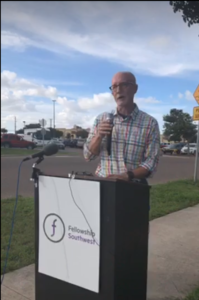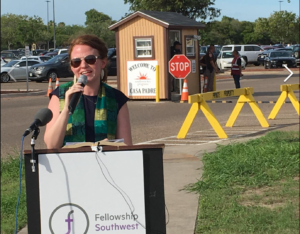A Cooperative Baptist Fellowship subsidiary organized a weekend vigil outside a former Walmart in Brownsville, Texas, re-purposed as the country’s largest migrant child care center to pray for children separated from their families while seeking asylum in the United States.

Marv Knox addresses Cooperative Baptists gathered at border for Sunday prayer vigil for migrant children separated from their families. (Facebook photo)
“It is not good or right or just or fair or decent or moral that parents and children should be stripped from one another and those children would be left with strangers for God only knows how long,” Marv Knox, field coordinator of Fellowship Southwest, said at the Sunday afternoon rally livestreamed on Facebook.
“It is not good that our neighbors should be vilified as rapists, as criminals and as subhuman,” said Knox, a former journalist hired last year to lead the new regional network supplementing the work of three existing CBF state and regional organizations to promote Baptist identity and cooperative mission and ministry across the Southwest.
“It is not good that the politics and civil discourse of our nation have turned to us versus them, that people are demeaned and treated with suspicion, not to mention outright anger, because their skin is brown, because their tongues vibrate with the trill of a different language and home reminds them of places south of the Rio Grande,” Knox said.
Suzii Paynter, executive coordinator of CBF Global based in Decatur, Georgia, said nine of the Fellowship’s more than 100 missions and ministries around the world work full time with migration.
“We are awash in global migration, but before these children were children from boundaries and borders, they were the children of God,” Paynter said at the rally.
“It is the promise of God that brings us here today, the image of God in each child that brings us to a point of remorse and sadness over unnecessary separation of children,” Paynter said. “These children, all children, are children of promise. And so, we look, we see, we sing, we pray. Dear Lord, bring these children together with parents. Bring our hearts together, for a way of human rights, to be gracious, hospitable and to be people of God in a world of laws. We can do both.”
Participating groups included EthicsDaily.com, website of the Baptist Center for Ethics, Pastors for Texas Children and several churches. A number of people attended with help from the Eula Mae and John Baugh Foundation.
Mitch Randall, executive director of the Baptist Center for Ethics, said the U.S. has a history of separating families, including his own. Randall said his great grandmother and her sister were separated from their family and relocated to an agricultural school near the Oklahoma/Kansas border where they were forced to assimilate and leave behind their Native American identity.
“From slavery to Native American separation to today immigrants crossing our borders, America has a dark history of separating children from their parents,” Randall said. “But it does my heart good to see people of decency, people of humanity, people who choose love over anything else, standing up and saying that is not who we are as a country, that is not who we are as a people of faith and demanding we act as a decent people.”
“As people of faith we follow the words of Jesus, when he opens up his arms and says let the children come to me,” Randall said. “That is the kind of America I want to live in. That is the kind of church that we are. And that is the kind of people as I look across this crowd today and as I travel the country and walk into local congregations everywhere, those are the kind of people that I encounter – people with open arms embracing the stranger, welcoming the immigrant.”
Jorge Zapata, associate coordinator the Cooperative Baptist Fellowship of Texas, described his personal experience of growing up in Brownsville as an undocumented child from across the border in Matamoros, Tamaulipas, Mexico.
“I just want to thank the Lord because I was given a chance,” Zapata said.
Zapata said his father was a Mexican citizen allowed to cross the border for seasonal work in agriculture. Their house in Mexico had a dirt floor, he said, and they lived in poverty.
“We had nothing to eat,” Zapata said. “My dad was having a hard time to feed us. So my dad thought about our future. We came over because my dad thought ‘I don’t want my children to live like me in poverty,’ and he brought us over [the border] to have a better life.”
Zapata said his mother, a U.S. citizen, wanted the children to be educated north of the border. Their Baptist church helped the family navigate the system allowing him to attain citizenship at age 12.
“You don’t understand this lifestyle until you have lived there,” Zapata said. “You don’t know what it is to live in poverty until you live in poverty for months and years and years, when there is no future for you for tomorrow.”
Zapata said the 1,100 boys aged 10 to 17 housed in Brownsville’s Casa Padre shelter are not there because they asked to leave their home. “They are coming because their parents want to give them a better life,” he said. “They come because these children don’t have a future for tomorrow, because there are so many gangs around in their own countries.”

Mary Alice Birdwhistell, a CBF pastor in Waco, Texas, speaks outside the former Wal-Mart now used as a shelter for migrant children in Brownsville, Texas. (Facebook photo)
In addition to offering prayer and compassion, speakers called for policy change.
“Like all of us I have been gut-wrenchingly sick hearing story after story about children being brutally and traumatically ripped from their families while seeking safety at our borders,” said Mary Alice Birdwhistell, pastor Calvary Baptist Church in Waco, Texas. “And all of this in response to our own government’s unjust policies toward immigrants? To this I say ‘No, not by my watch.’”
“Jesus said let the little children come to me and do not hinder them, for the Kingdom of Heaven belongs to such as these, and yet our government has been operating at the expense, the abuse and the trauma of little children? I say no, not by my watch,” she continued. “We must listen to their wailing cries, cries that transcend any language. To all this as people of faith we can be silent no longer. We must cry out no, not on our watch.”
Jon Singletary, dean of the Dianna Garland School of Social Work at Baylor University, said he has a hard time imagining what it must be like for migrant families facing life and death decisions on behalf of their children.
“I cannot imagine my children being used as a deterrent for decisions that I have made,” Singletary said. “I cannot imagine standing by as your children are being used as a deterrent for choices that you make. I can’t imagine allowing that to happen and I can’t imagine allowing it to happen to the children of our neighbors.”
“So we gather today hoping that we find a way in our nation for that to happen no more,” Singletary said. “We hope we are learning lessons of mercy and lessons of justice. We hope that we find new ways forward for our families, for our children. We are all in this together.”
Knox recalled President Donald Trump’s campaign promise to “make America great again.”
“People say they want to make America great again, but we have assembled here because we want to make America good,” Knox said. “This is a vital undertaking, because America is on the verge of losing her goodness. And naturally, the two are inextricably related.”
“We come here today because we fear America has lost her moral moorings and is up to no good,” Knox said. “We want America to be good again, because we love all people, because we stand with our sisters and brothers wherever they live, in Mexico, throughout Latin America and around the world.”
“We leave this place vowing to make America good again,” Knox said. “If America can become good again, greatness will take care of itself. So today we resolve to remain aware of the situations that cause others to be afflicted. We resolve to advocate for those, as we have said this afternoon, whose voices cannot be heard unless we amplify them. We resolve to take action.”
